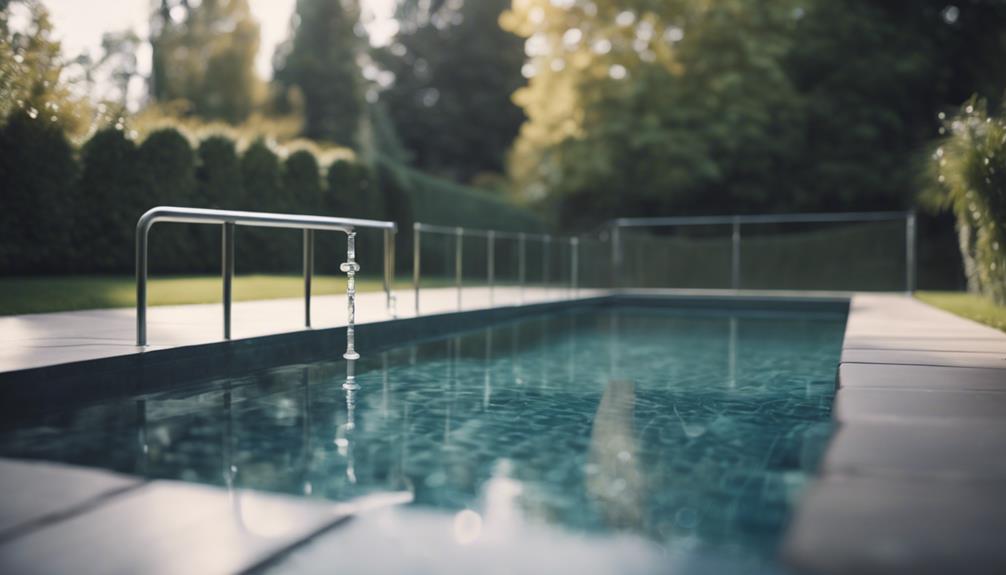How to ground pool fence spigots
To ground pool fence spigots, it is important to recognise this as a crucial safety measure. If your spigots are located within 1.25m of the pool's edge, grounding them is necessary to reduce electrical risks, following the AS/NZS 3000:2018 standards.
Use copper bonding wires for this purpose, and consider using non-conductive spigots or those with insulated sleeves as safe alternatives. It is recommended to hire a certified electrician who is familiar with these standards to ensure proper installation and compliance with regulations, reducing the chance of electrical accidents.
Exploring methods like recessed concrete channel fixing can further enhance safety and aesthetics. By implementing these steps, you can keep your pool area safe and compliant, giving you peace of mind and a better understanding of how to improve safety in your outdoor space.
Understanding the Necessity of Earthing
Understanding the necessity of earthing pool fence spigots is essential to prevent electrical hazards and ensure your pool area adheres to safety regulations. Earthing, or grounding as it's often called, is a fundamental safety measure that mitigates the risk of electric shock by providing a path for electrical current to flow safely to the ground. This process is particularly vital for pool fence spigots, which, if not correctly earthed, can become conduits for electrical currents, posing a significant risk to anyone in or around the pool.
BS 7671:2018 outlines stringent requirements for the earthing of pool fence spigots, stressing the importance of adhering to these standards to maintain safety. Compliance with these regulations isn't just about avoiding penalties; it's about ensuring that your pool area is a safe environment for everyone. Different materials used in pool fencing, such as glass and aluminium, have specific earthing requirements to address their unique conductive properties, further highlighting the need for professional design and installation by licensed electrical contractors.
Ensuring the correct earthing of pool fence spigots is paramount for preventing electric shocks and maintaining compliance with safety standards. This approach safeguards not only your loved ones but also contributes to the overall electrical safety landscape.
The Rules and Regulations
Understanding the importance of earthing pool fence spigots is crucial. Let's explore the specific rules and regulations that require this safety measure. Firstly, pool fence spigots located within 1.25m of the pool edge must be earthed, following the AS/NZS 3000:2018 standards. This rule aims to reduce any electrical dangers, thereby improving safety around the pool.
For those choosing glass or aluminium fencing, it's important to note that different earthing requirements apply. Glass fencing, due to its conductivity properties, needs careful consideration. Alternatively, using insulated or non-conductive spigots is allowed to meet safety standards without the need for earthing, giving design flexibility while ensuring compliance.
Involving a licensed electrical contractor in the design and installation of the earthing system for pool fence spigots is essential. These professionals ensure that your pool's fencing system is properly and effectively earthed, following strict regulations designed to protect you and your family from electrical hazards.
Earthing Methods Explained
You are now equipped with the basics; let's explore the specifics of earthing your pool fence spigots.
We'll cover direct earthing techniques, the use of earthing materials, and how to ensure compliance with safety measures.
Understanding these points will guide you to a secure and compliant installation, whether you're opting for traditional or innovative solutions.
Direct Earthing Techniques
To ensure that your pool fence spigots are safely grounded, it is essential to connect them to an earthing point using copper bond wires. This direct grounding technique involves running copper bond wires between each spigot within the earthing zone, ensuring that they are all properly connected to the ground.
This method not only reduces the risk of electric shock but also ensures that your pool area meets safety standards. By creating equipotential bonding through these connections, you maintain the same electrical potential across all components, minimising hazards and ensuring a safer environment around your pool area.
Utilising copper bond wires for direct grounding is key to achieving this level of safety and compliance.
Using Earthing Materials
When grounding your pool fence spigots, choosing the right earthing materials is crucial for effective and compliant safety measures. Copper bond wires are commonly used to connect each spigot to an earth point. However, the cost of hiring an electrician can be significant, so alternatives such as non-conductive spigots with insulated sleeves are a practical choice. Furthermore, the method of installation involving a recessed concrete channel before tiling provides a sturdy solution that requires careful planning and installation ahead of time.
| Earthing Material | Description |
|---|---|
| Copper Bond Wires | Connect spigots to an earth point, ensuring a solid ground connection. |
| Insulated Sleeves | Provide a non-conductive barrier on spigots, used with non-conductive spigots as an alternative earthing method. |
| Non-Conductive Spigots | Spigots designed to reduce conductivity, used with insulated sleeves for earthing. |
| Recessed Concrete Channel | A method for grounding spigots prior to tiling, ensuring compliance and safety. |
These options provide a range of compliant solutions for effectively earthing pool fence spigots.
Safety Compliance Measures
Ensure your swimming pool fence spigots comply with safety regulations by using appropriate earthing methods. This can involve insulated sleeves or stainless steel components that are earthed within 1,250mm of the pool's edge. Grounding these elements significantly reduces the risk of electric shock, making your pool area safer. It is essential to follow these precautions to meet compliance standards and protect all pool users.
For non-conductive spigots, insulated sleeves provide an effective alternative to direct earthing, ensuring safety and compliance. Additionally, using recessed concrete channel fixing methods that comply with AS/NZS 3000 requirements is another viable solution.
It is recommended to seek advice from licensed electrical contractors to guarantee that your earthing practices for pool fence spigots adhere to regulations, preventing electric shock and maintaining a safe environment.
Choosing Non-Conductive Taps
When selecting non-conductive spigots, you must consider material safety and adhere to installation best practices.
These spigots, with their insulated sleeves, ensure your pool fence doesn't conduct electricity, thereby enhancing safety around water.
It's essential you choose products like those offered by Glazed Co. for compliance and reduced risk of electric shock.
Material Safety Considerations
Selecting non-conductive taps is crucial to ensure safety around your swimming pool, as they are fitted with insulated sleeves to prevent electrical conductivity. Glazed Co. provides these as a cost-effective option, eliminating the need for complicated earthing and electrical work. Their use ensures compliance with safety standards and simplifies the installation process.
| Feature | Benefit |
|---|---|
| Insulated Sleeves | Prevents electrical conductivity, enhancing safety. |
| Compliance with Safety Standards | Meets AS3000 requirements, reducing the risk of electric shock. |
| Simplified Installation | Avoids complex earthing setups, saving time and money. |
Choosing non-conductive taps not only addresses safety concerns but also simplifies the earthing requirements, ensuring a safer and more efficient installation process for your pool fencing.
Installation Best Practices
After understanding the safety and materials considerations, the focus moves to the correct installation of non-conductive spigots for your pool fence. Choosing non-conductive spigots with insulated sleeves is not just about following compliance standards; it presents a cost-effective safety approach that removes the need to hire an electrician for earthing.
- It is advisable to install non-conductive spigots using a recessed concrete channel fixing method, as recommended by Glazed Co., to meet safety and compliance standards.
- It is recommended to connect an earth wire between spigots and a designated earthing point to enhance safety measures, even when opting for non-conductive choices.
- Opting for spigots that come with insulated sleeves is advised to reduce any conductive risks, ensuring a safer installation of the pool fence overall.
Installing Earth Wires
To ensure that your pool fence spigots comply with safety regulations, it is necessary to install earth wires that connect them to an earthing point. This step is crucial for maintaining electrical safety around your pool area. By grounding your pool fence spigots, you create a safer environment that adheres to electrical safety standards.
Using non-conductive spigots, such as those available from companies like Glazed Co., can be an effective strategy to meet these compliance requirements without the need for extensive wiring. These spigots are equipped with insulated sleeves, thereby eliminating the direct path for electrical current, which significantly reduces the risk of electrical shock.
If you choose not to use non-conductive spigots, the installation of earth wires must be carefully considered. These wires should be securely connected between each of the pool fence spigots and an appropriate earthing point. Ensuring this connection is strong and complies with all local regulations regarding electrical safety and earthing is essential.
For those looking for a more integrated solution, the recessed concrete channel fixing method is worth considering. This approach requires planning before tiling, as it involves embedding the earthing solution within the concrete channel, thus ensuring compliance with regulations and offering a seamless aesthetic finish.
Hiring a Licensed Electrician
Employing a licensed electrician is crucial for the design and installation of earthing systems on your pool fence spigots, ensuring they comply with the AS/NZS 3000 standards. Their expertise significantly reduces the risk of electrical hazards, providing a safe environment around your pool area. Adhering to these standards is not just about following the rules; it's about safeguarding your family and guests from potential electrical accidents.
By choosing to work with a licensed electrician, you will benefit from:
- Expertise in AS/NZS 3000 Standards: Their knowledge ensures that all installations meet current safety standards, reducing the risk of penalties for non-compliance.
- Reduction of Electrical Hazards: Professional installation lowers the risk of electrical shock or accidents, creating a safer poolside environment.
- Advice on Best Practices: Licensed electricians can offer valuable guidance on maintaining your earthing system and preventing future electrical issues.
Recessed Concrete Channel Fixing
Recognising the necessity of engaging with a certified electrician for earthing systems, we will examine the process of affixing glazing spigots to a recessed concrete channel as a practical approach for your pool fence spigots. This method not only enhances the visual appeal of your pool area but also ensures a stable base for your fence spigots, which is essential for both safety and regulatory compliance.
The initial phase involves planning and constructing a concrete channel in the foundation, a task that requires precision and careful consideration. The channel must be accurately positioned and shaped before any tiles or final surface is applied. This proactive step ensures that the installation of spigots is smooth and structurally sound.
Opting for a recessed concrete channel fixing requires installation before any tiling is done. This timing is crucial for incorporating the earthing of your pool fence spigots into the construction phase, thereby avoiding disruptions and potential additional work.
It is important to discuss your specific project requirements with professionals, such as those at Glazed Co., who can provide guidance on the available options for your pool fence. Their expertise guarantees that your installation not only meets your aesthetic and functional needs but also adheres to the relevant safety standards.
Ensuring Compliance With AS3000:2018
Ensuring your pool fence spigots are in line with AS3000:2018 standards necessitates the engagement of a licensed electrician for appropriate earthing, aiming to reduce electrical hazards. This measure isn't solely about compliance; it's about protecting your family and visitors from the risk of electric shock, an issue directly addressed by AS3000:2018.
To ensure your pool area meets these standards and is safe, consider the following essential steps:
- Engage a licensed electrical contractor: They possess the necessary knowledge to interpret AS3000:2018 standards accurately and apply them effectively to your pool fence spigot earthing project.
- Comprehend the specific requirements: AS3000:2018 provides detailed specifications for the earthing of pool fence spigots to prevent electrical hazards. Becoming familiar with these details can help you grasp the significance of each step in the process.
- Acknowledge the risks of non-compliance: Not adhering to AS3000:2018 standards can put individuals at risk of severe electrical shocks and result in legal consequences for not following safety regulations.
Checking Pool Fence Earthing
To ensure that your pool fence spigots are safely earthed, conducting thorough checks in accordance with AS/NZS 3000:2018 standards is essential. This process ensures that your pool area is free from electrical hazards, reducing the risk of electric shocks. It is important to note that spigots located within arm's reach should be insulated or properly earthed as outlined in AS/NZS 3000:2018, particularly in sections 5.6.2.5 & 5.6.2.6. These guidelines are designed to protect you and your family from potential dangers posed by electrical currents near water.
Involving licensed electricians in the design and installation of the earthing system for pool fence spigots is not just a recommendation, but a requirement. These professionals have the expertise to ensure all safety standards are met, providing assurance that your pool fence complies with the strict regulations in place. Seeking advice from a licensed electrical contractor during the design phase is crucial. Early collaboration can help prevent overlooking important details, thus avoiding the severe consequences associated with electric shocks. Safety and compliance are of utmost importance when earthing your pool fence spigots.
Frequently Asked Questions
Do pool spigots have to be earthed?
Yes, you need to ground your pool spigots if they are within 1250mm of the pool's edge to comply with safety standards. This helps to prevent electric shocks and ensures that you are adhering to AS/NZS 3000:2018 regulations. It is important to always use a qualified electrician.
Does Aluminium Pool Fence Need to Be Earthed?
Yes, your aluminium pool fence does need to be earthed, especially if it's within arm's reach of the pool's edge. It's crucial for preventing electric shocks and ensuring your swimming area remains safe.
What are the earthing requirements for pools in AS3000?
You must ensure that pool fence spigots within 1.25m of the pool edge are earthed, as required by AS3000. This is important for minimising the risk of electrical shocks, and it involves the need for a qualified electrician to carry out the installation correctly and in line with regulations.
Do Fibreglass Pools Need to Be Earthed?
You don't need to earth fibreglass pools because they're non-conductive, eliminating electrical risks. Focus on grounding equipment instead. Unlike metal pools, they don't require earthing, making your installation process simpler and safer.


